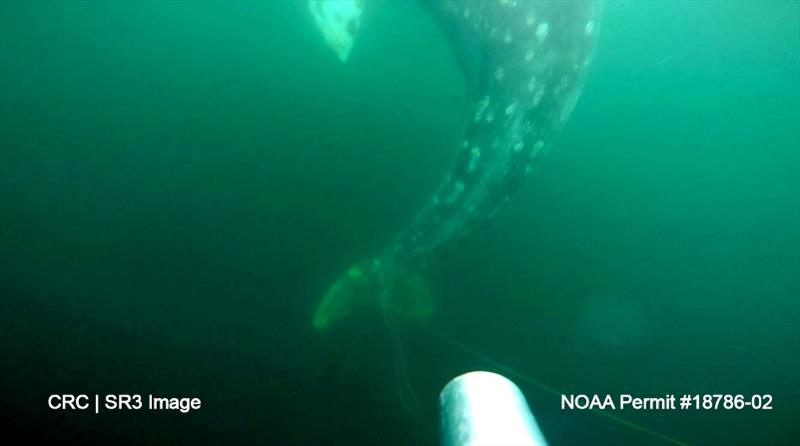
Entanglement Response Team removes anchoring line entangling a gray whale off Olympic Peninsula
by NOAA Fisheries 1 Jun 2018 22:18 AEST

The gray whale's tail was held 15 feet below the surface © CRC / SR3 under NOAA Permit #18786-02
Response teams from NOAA Fisheries' Large Whale Entanglement Response Network attempted to free a juvenile gray whale entangled in fishing gear about 20 miles off Washington's Olympic Peninsula on Wednesday afternoon, May 9, 2018.
The team removed some of the weighted fishing gear that had been entangling the whale for up to a month. Jeff Pederson on the FV Harvester of Harvesters Catch first reported the entangled whale to the U.S. Coast Guard early Tuesday morning. The Coast Guard relayed the information to the Entangled Whale Hotline, (877-SOS-WHALe or 877-767-9425) and NOAA Fisheries activated a response from teams based in Olympia and Seattle.
While the response teams from Cascadia Research Collective and SR3 trailered their equipment to La Push on Tuesday, a U.S. Coast Guard helicopter from Air Station Port Angeles diverted to the whale's location to confirm details. By early afternoon, a vessel from the U.S Coast Guard Station Quillayute River joined the first response vessel to assess the situation and health of the whale.
Unfortunately, the whale was in poor condition because the lines had cut deeply into its tissue, causing an infection. The forward part of the whale's body was bloated, preventing it from diving. In addition, the skin and tail flukes were deteriorating and another line weighted down the tail 15 feet below the surface, leaving the whale unable to swim.
The weather had deteriorated greatly by the time the second response team arrived on the scene Tuesday. The team could not safely access the lines to cut them and complete the disentanglement before sunset. The team attached a telemetry buoy to the whale so that they could quickly locate the whale the next day.
In the meantime, the responders consulted a team of veterinarians about the whale's condition. Based on their prognosis and the deteriorating weather forecast for the next week, the U.S. Coast Guard vessel again accompanied a response team to the whale's location on Wednesday afternoon.
The Teams cut the lines wrapping the tail and removed the weighted gear holding the tail underwater. However some embedded line and a short bit of trailing gear remained. The whale's posture did not change once it was freed from the weighted gear, suggesting that the whale may have suffered long-term or permanent damage. After two hours the whale started increasing movement of its tail, which gave responders some hope. However, the long-term prognosis for this whale is poor due to its serious injuries.
The extensive assistance of the U.S. Coast Guard and the prompt initial report by Jeff Pederson made the response possible. The quick action the team provided to this whale have given it the best chances of recovery and survival given the circumstances.
NOAA Fisheries and the response teams would also like to thank the community of La Push, Washington, for providing support and hospitality for the response teams.